

|
Back to |
| The Front Page |
| Letters & Opinion |
|
The hardest lesson: Learning how to lose by Eric Sawyer Illustrations courtesy of Eric and Caren Sawyer Posted January 29, 2013
|
||||||
|
||||||
I admit it. I am a bad loser, and I will tell you the stories that prove it. It's okay if these stories make you laugh. I tell myself that my life must be blessed if losing a croquet match can cause me such grief. But it's true. I'm a really, really bad loser.
I've come to realize that my bad attitude about losing is both a blessing and a curse. So I have mixed feelings about it. Itís a blessing because, oddly enough, some of my worst losses in croquet have led to my greatest improvement afterward; I dwelt on the losses so much that I devoted enormous amounts of time and energy reconstructing what went wrong, figuring out how I could improve, and then putting in lots of practice. So in defeat, I learn a lot about my game. The more I learn, the better I get. But there's still a cost in lost sleep and wasted energy.
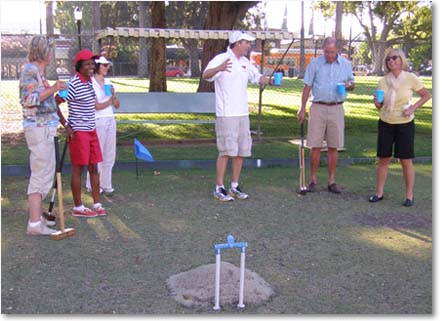
|
| On a Pasadena Croquet Club lawn under lengthening shadows, Eric (gesturing in center) explains the rules of Crazy Croquet, borrowed from Duncan Hector of the Bygrave Croquet Club, to after-work celebrants grasping the day's cocktail of choice: margaritas. PCC's 22 members are an unusually young group, mostly recruited by Eric and his wife Caren, who founded it half a dozen years ago. While Eric has suffered many gut-wrenching losses in his playing career, his efforts in helping to build the Pasadena Croquet Club from nothing to something has been nothing but a victory. |
Sometimes it seems to me that I practice and play hard because avoiding the pain that comes from losing is more important to me than the temporary exhilaration that comes from winning. After all, I tell myself, every win is followed by another game, every tournament by another tournament. But in my soul, I don't buy it: for me, every defeat is followed by blackness, depression, and mourning. Every time I lose, I feel like a little piece of me has died.
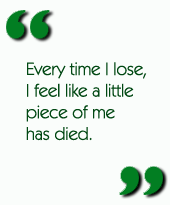
I wonder what will happen in ten years when I read this article. Will I be pleased, having subsequently recognized my naivetť? Or will I understand, after the fact, why I have quit playing? My attitude about losing will have a big impact in either scenario. And Iím not alone.
The responses of other players much more celebrated for their victories than I am have surprised me. Their perspectives on their own losses have caused me to rethink my own horrible attitude. But can a bad loser learn to become a good loser? Or is a bad loser doomed to be just a loser? Perhaps in studying the way other players deal with defeat, I may exorcise my own demons, or at least come to grips with them.
Witnessing my own funeral
The importance of this issue crystallized to me at the end of the Mission Hills Croquet Clubís annual golf croquet championship in 2012. One of my friends there said something to me in jest that really made me think hard about my attitude on losing.
Having recently placed third in the 2011 USCA Golf Croquet National Championships in both singles and doubles, I was one of the favorites to win the MHCC club championship. According to my world ranking and my own over-blown opinion of my ability, I was the favorite. But after hurting my back minutes before my first match and then playing some really rough matches early on, my confidence was shaken.
Nonetheless, I clawed my way into the semi-finals and faced perennial club Golf Croquet champion Jim Butts. We had a chippy match, marked by a major dispute and argument at the end of the first game, splitting the first two games 7-6, and playing to a 6-6 tie in the rubber game. I ultimately lost the third game and finished third overall in the tournament. Little consolation.
Moments after I lost, it began: the fog of depression began to settle in like the cold lifeless fog that rolls over the Bay Area in the early afternoon. My mind focused solely on the missed shots and blown strategy, over and over again. I knew I would not be much fun that night. I knew sleep would be spotty. So when I was invited to the post-match party at the club's favorite restaurant, I said something along the lines that my attending that function would be a little like going to my own funeral.
Fast forward to the post-match "toast and tally." Most of those involved in the tournament, and their spouses, were seated at tables, enjoying cocktails and waiting for their meals. I was trying to be a good sport. Then there was a quiet. I had an eerie sense that I was becoming the focus of attention. All of a sudden, Tournament Director Ben Rothman made a speech that sounded kind of like a eulogy, and it was about me.
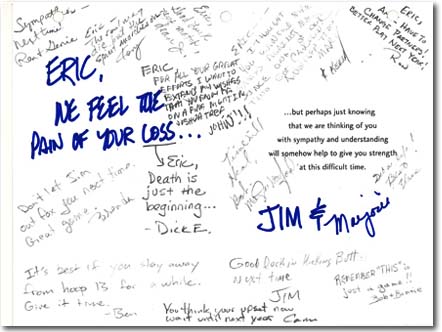
|
| Many players in the Mission Hills Golf Croquet singles tournament signed this condolence card for the Eric's croquet funeral following his narrow semi-finals loss to Jim Butts. |
Ben described to the crowd my attitudes about losing, and that I felt like I was attending my own funeral. Then I was formally presented with the kind of ďregretsĒ card you would send to somebody who has just lost a loved one. It said, ďEric, we feel the pain of your Loss.Ē Most of those in attendance signed the card, some with humorous comments. The best one was from Jim Butts, the guy who beat me in the semi-finals. He wrote, ďGood luck in Kicking Butt[s] next time. Jim.Ē Ben wrote, ďItís best if you stay away from hoop 13 for a while. Give it time.Ē
Then came the comment from my friend Jim Okey, sitting next to me, that brought my mind to a screeching halt. He was responsible for getting the condolence card and having it signed. Seeing me me smiling and laughing at the comments, he told me, ďEric, Iím glad youíre taking this so well. For a while, I thought you were serious about all this losing stuff, and I was starting to think how creepy it is to know someone like that.Ē Thatís when it hit me: Jim didnít think I was serious about feeling like I was attending my own funeral. But I really was serious. I really did feel like that.
My next thought was, "Am I creepy?" I had always told myself that I could use my bad attitude about losing as an ally in my struggle to get better as a croquet player. Did I have it backwards?
Chris Clarke: Having a balanced attitude
Chris Clarke is one of the worldís best croquet players. He has twice won the Wimbledon Cup as the Worldís Champion of Association Croquet and has frequently been ranked by the World Croquet Federation as the number one player in the world. Few champions of the sport are as familiar with winning, and losing, as Chris.
During recent e-mail correspondence with him on another topic, I tossed in a comment about what a poor loser I am, and told him about attending my own croquet funeral. Chris responded:
|
I try to take a more balanced view--remember Iím a professional gambler. If you lose one game or one event, then itís important to try and take some positives (enjoyment) out of that. If you lose every event you play in that season, then itís probably ok to be funereal. Nobody wins all the time. One of the keys to being a good sport is to be able to look your opponent in the eye at the end of a match and shake their hand with a smile on your face. Like most things in life, itís about getting the balance right--enough annoyance to ensure you are properly motivated, but enough happiness to keep the rest of your life in balance.
|
Chrisís comments are interesting on many levels. Being a gambler, he has to deal with the inevitable losses and keep a balanced approach. And as he observes, nobody wins every croquet match, not even the best players in the world. And he is absolutely right that no matter how you internalize your own feelings about a loss, you still should congratulate your opponent and be a good sport. There is nothing more selfish and self-absorbed than a player who ruins another guy's moment with poor sportsmanship.
As in all things in life, there must be balance. If there is no negative reaction to a bad loss, you may not feel the need to practice or fix the problem that caused it. On the other hand, if you dwell too much on the loss, you may end up in a self-destructive cycle and find yourself out of croquet. Wouldnít that be the ultimate irony: taking defeat so hard that you end up losing the sport you love by abandoning it?
The Pursuit of Perspective: Wayne Rodoni
When I mentioned the subject of this article to Croquet World Online editor Bob Alman, he suggested I contact Wayne Rodoni. Iíve never met Wayne or seen him play, but I've read and heard stories about him. In his day, Wayne was regarded as one of the best players in the United States. He received the highest honor: being named to the American team for the 1996 MacRobertson Shield Test Matches. Bob told me:
|
I will never forget Wayne Rodoniís comment to me in the late nineties, when he suddenly stopped competing and I asked him why. At the time, he was the biggest player in America, expected to win any tournament he entered...and he usually did, in American Rules. He was very clear in his answer. He said, "I've already won everything, Bob. Now, all I can do is lose.Ē And of course it was true, from his point of view....
|
I was intrigued. I was aware that one of my croquet mentors, Rhys Thomas, knew Wayne well. So I asked Rhys about Wayne, and he told me:
|
Wayne is a true gentleman and sportsman and probably the best player in America during the 1990s. As Bob said, he won everything. The last couple years he played he didnít practice at all and his game slowly (very slowly) eroded. It finally got to the point where he might lose a game or two to people he would never have lost to before, and he hated that. Toward the very end of his tournament career, he told me he just couldn't handle losing like that, and that was just about the last time I saw him in whites.
|
I became more intrigued. Bob and Rhys painted a picture of a person who hated losing so much that he gave up croquet. Does the need to win exact that high a price? So I called Wayne myself, and we talked for almost an hour. At first Wayne said that Bob and Rhys took his comments out of context. Although Wayne admitted part of his decision to stop playing croquet was related to dwindling playing time and erosion of his skills, he said that was a very small part. So why did Wayne stop playing croquet? He got married. He became more involved in work and other interests. The nearest croquet court to him was over an hour drive away. And it was getting progressively harder for him to commit to one, two or three week tournaments. So he just stopped playing.
What I found most interesting was his comments on the consequences of losing. Wayne mentioned that before croquet he had raced motorcycles, a dangerous sport indeed. He explained that when you make a mistake in racing, you risk serious injury to yourself and others. But in croquet, there is no such risk. So he could view croquet as simply a game. Wayne told me:
|
I was never nervous before a match. I enjoyed playing croquet. I always tried to keep it light. I hated losing, but if I lost, I knew that I wasnít losing my life or my job or my car. I wasnít earning a living with that mallet. So Iíd just wait until the next match. Croquet seemed mundane compared to other activities.
|
The point Wayne makes is about perspective. No matter how good we get, no matter how important croquet is to us, we have to keep it in perspective. Itís not life-or-death. Itís simply a game. After Wayne found other ways to occupy his time and playing croquet became inconvenient, he simply gave it up. No sleepless nights. No agonizing over defeats. He just moved on. Wayne says he now plays badminton. ďFor fun, for exercise. Iím just an old club player now.Ē
Alix Verge: Are We Playing Golf Croquet or Association Croquet?
When my wife read an early draft of this article, she chided me for not including a top-ranked female player and accused me of being a chauvinist. So naturally I wasted no time in contacting Alix Verge, who won the 2009 Womenís World Golf Croquet Championship and became the first Australian to ever win a world individual croquet title of any kind. She is also currently ranked in the top 150 of all Association Croquet (AC) players in the world by the WCF. Alix surprised me with her answer:
|
I hate losing at Golf Croquet. Itís exhausting standing up all day and constantly having to think and rethink oneís shot selection every time the opponent decides on their play. All my pleasure in GC derives from winning, and I see a losing day as a wasted day. The only good that comes of losing is that itís really obvious what skills one needs to go away and practice. Losing in Association Croquet is different. I donít mind losing if my opponent has played well, because I watch closely and learn from ball placement, shot selections and technique, and I try to be a good out-player by maintaining confidence in my ability to hit balls at 9 or 12 yards, or 17 (yeah!). If I miss the lift(s) and my opponent wins with controlled breaks, then I sprint to the next game to get another chance as soon as possible. What is devastating is to lose because I have played badly. Except on lawns of exceptional difficulty I know I possess all the skills to hit in and make my desired breaks but on some occasions, whether by tension or inattention, I simply cannot string together a series of good shots and I know that this has to be caused by lack of focus alone. There is no one to blame but me and so I sit on the sidelines flogging myself (metaphorically) and trying to think of gracious things to say to the victor. It is even more difficult to be gracious if the victor has played poorly. ďThanks for all the chancesĒ is about as much grace as I can muster and I find it very difficult to pull myself together and start the next game in a positive frame of mind.
|
I had never thought about a duality of losing in terms of GC vs. AC, but Alix makes a great point. In GC, you have a chance of scoring every single hoop, and for every hoop you lose, you have the odds in your favor on the next hoop because you'll be the first to take position. So if you lose, itís either because you played poorly or because your opponent out-played you. Either way, you are to blame, either for poor play or because you need to get better.
In GC, it is all on you. But AC is different. In some games, your opponent gets the innings first and proceeds to play perfectly; to lose, all you did was miss one or two lift shots from anywhere between 30-50 feet. You can hardly be blamed for that. Sometimes in AC, there isnít much you can do but sit and watch. Alix gives me pause when thinking about losing an AC game. Maybe I should just sprint to the next game and outrace the fog of depression before it rolls in?
The Zen of Playing, by Rhys Thomas
Rhys Thomas and I play and discuss croquet often, and I value his opinions on things croquet. Sportsmanship comes up as a regular topic. In his day, he was one of the top American players. He was a member of two of the early American Solomon Trophy teams, and he was the manager of the American team that played in the 1996 MacRobertson Shield Test Matches. I also view him as a sort of Forrest Gump of croquet: the man knows and/or has played with every notable croquet player in the world.
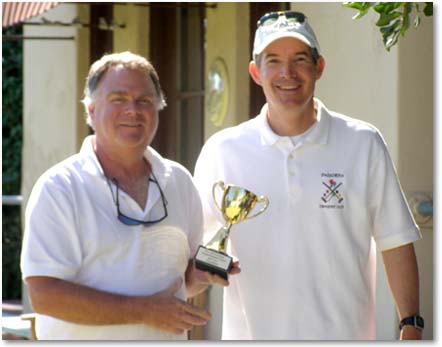
|
| Eric presents the 2011 PCC cup to one of his mentors, Rhys Thomas of Beverly Hills. |
Rhys is fairly horrified by my attitude on losing, but he tries to be non-judgmental, the way an adult would try to shepherd a wayward child. Rhys has shared with me that he, like Chris Clarke, tries to keep a balanced approach, ďthe Zen of playing croquetĒ as he calls it: just the delight of going out and hitting some balls and having fun.
But that is not the way Rhys is naturally wired. Rather, he has gravitated to this attitude over many years of playing. He wrote to me recently:
|
I used to be a terrible loser (and Iím not much better at it now), but it got to the point where I wondered who the hell I was looking at in the mirror. I was one person in everyday life, calm and laid back, and a completely different person on the croquet court, maniacal about winning. It got to the point where I didn't like myself at all on the court. So I did some self-introspection and therapy and taught myself how to back off and simply enjoy the game and the people I met. I still blow up at times--very hard to exorcise the croquet demons--but I just donít play well enough any more to get that worked up. I can only tell you this ... I've had many unsatisfying wins in my career, either when I played poorly and still won, or when I prevailed over an opponent that I had great respect for and simply felt no joy in beating them. On the flip side, the most fun I ever had in croquet was the finals of the 1991 or 1992 Palm Beach Invitational when I played John Osborn. The crowd (about 500+) loved it. [At the end] he had a 17-yard suicide shot at the peg, and he did it [to win]. I could only applaud and congratulate him. It was easily the most exciting game Iíve ever been in and the most fun, even though I lost. So itís not really about winning or losing, itís about the game itself, the process on the court, and enjoying the time spent out there.
|
Disaster in Mendocino: How to Ruin a Vacation
When my wife Caren and I drove up along the California coast for vacation, one of our stops was in Mendocino. We stayed at a bed and breakfast in town that included croquet among its amenities. Not really. What they had was a grass courtyard with an old, termite infested backyard croquet set. Nonetheless, it was croquet. So I challenged my wife to a game.
My wife wasnít so sure about playing. She knows me. But I insisted and she relented. So there we were, playing nine wicket croquet, on an overgrown lawn, with crummy equipment. And she won. Handily. It was a nightmare. I couldnít believe it. The weather mirrored my emotions. It got chilly, then gloomy, and then it started to sprinkle. My wife went inside. I stayed on the court. Transfixed by defeat. All I could do was practice. In the rain. By myself. My wife thought the scene was so funny she had to take a picture of me from our room upstairs.
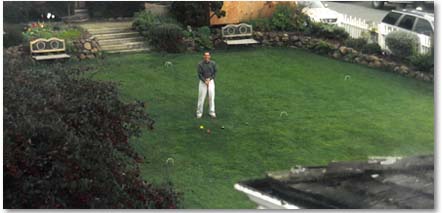
|
| After a humiliating loss to his wife in a nine-wicket match at a B&B on vacation in Mendocino, Eric practices alone trying to figure out how it could have happened. |
But the practice did not help. The fog of depression took hold just as the actual fog from the ocean wandered into the coastal town of Mendocino. Cold to the bone. Numbing. Sleep was spotty. Even as we drove up the coast and witnessed other incredible spectacles of nature, I couldnít get the thought of losing out of my mind. It took a while. She still kids me about it (see below). But now I have a rule: no more croquet games during vacation!
Thoughts from My Wife!
I thought my wife Caren could shed more light on my problem. After all, nobody knows me better than she does. And nobody has had to put up more with my fogs of depression. So I asked her to jot down some thoughts. I told her she could also draw a cartoon if she wanted. She did both. So hereís Caren:
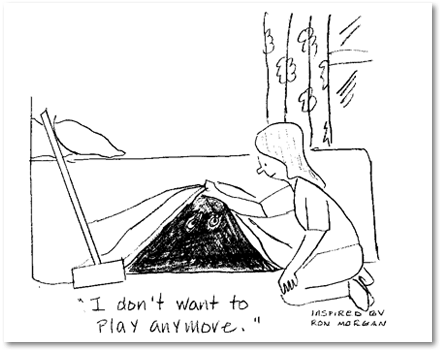
|
| Caren Sawyer drew this cartoon dramatizing her husband's reaction to losing a croquet match. |
|
They say admitting you have a problem is the first step, so I see this as a good sign. Some of you may think that Eric is joking in this article but he is not, and this is not only restricted to croquet. Iíve seen him in a fog after many events when he does not achieve his goals (or the rare times I beat him in pool); however, after a spell spent wallowing in his fog of pity, he learns from the loss and does better the next time. He may hide under the bed (see above) or sit around and watch TV for a time but eventually the fog lifts, usually as another tournament approaches. It may be that losing is part of what compels him to be a winner. He practices hard to win, but also to not lose. I am not sure which is greater to him. As long as he doesnít give up, or throw his mallet, I think he will survive through the fog. In fact, he has come a long way from that day in Mendocino; I beat him this summer during a golf croquet tournament and he seemed fine until he lost to someone else. He even hugged me right after the game when I know he was suffering. One final thought, if you never lost, how much could you really value winning?
|
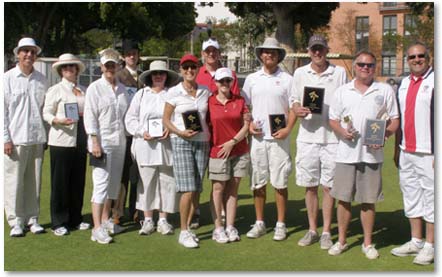
|
| The Pasadena Club attracts players from throughout Southern California. Eric and Caren Sawyer are both wearing red in the middle of this picture of players in the "Mohammed & Friends" golf croquet doubles event. On the right are Ben Rothman, David Collins, Rhys Thomas, and Mohammad Kamal. |
The Pressure from 40 Years of Playing: John Prince
John Prince is one of the all-time greats of croquet. He has played in more MacRobertson Shield Test Matches than any other player in history and was one of the early inductees to the World Croquet Federationís Hall-of-Fame. During my research for this article, I was pointed to a story about John which appeared on Croquet World Online many years ago. John said:
|
[In 2000] . . . I became the first player ever to notch up 100 matches in the MacRobertson. To mark the event, all the team players in a kind gesture formed a 'guard of honour' as I went out to play match number 100. It was rather nice that my 100th match, a singles, was against Robert Fulford, the World No.1. But I made no contest of it. Early in the first game I was faced with a position very similar to the one against Solomon 40 years earlier, when I had astonished the gallery by hitting my opponent on the first rotation. But now, I looked at Fulford's ball some 10 yards away on the boundary, and it looked the size of a marble. I knew I would never hit it! In that match, I felt the entire 40 years past as a player pressing down on my shoulders like a ton of weight. I knew without doubt, history was not going to repeat itself here, this was never going to turn into a purple patch, just a big black hole!
|
I was struck by what John said. First, 40 years earlier, when he was an upstart facing off against the legendary John Solomon, he felt no pressure and played well. In time, he became an all-time great. But 40 years later, the roles had reversed. He was now the legend, playing against a much younger player who was on the upswing. And John felt 40 years of pressure bearing down on him. Is that what John Solomon felt 40 years earlier when he had to face off against the up-and-coming John Prince? Just think how much 40 years of expectations can weigh.
So I contacted John about this article. I was interested in his thoughts on losing, particularly when losing to a player not expected to beat you. John was gracious in quickly providing me with a very thoughtful response:
|
[In 2000] . . . I became the first player ever to notch up 100 matches in the MacRobertson. To mark the event, all the team players in a kind gesture formed a 'guard of honour' as I went out to play match number 100. Quite an opportune time for you to contact me, as I've just played a weekend tournament here and only won 2 games from 7, possibly my all time worst result! The games I won were of a poor standard but someone has to get to the peg eventually! Playing conditions were easy, it was a very strong field with some very good play from the front runners. In my early days I set myself a high standard endeavouring to play error free croquet, I expected to go round off the 4th ball or fifth turn and finish each break. I wasn't overly concerned about who my opponent was. I was really competing against myself in my attempt to play games making no mistakes, with each shot played to perfection. I guess I was striving for a perfect performance rather than playing a competition. However, I felt it was a privilege when I got to play the likes of John Solomon and I just wanted to play really well against him out of respect for the fine player he was. When I did lose it wasn't a nice feeling, especially as Croquet meant so much to me. I was very driven, I analyzed what went wrong, did heaps of practice, so I won more often than not. Being concerned about the outcome of a match especially against someone you feel you should beat is a negative mindset, best to just concentrate on being grounded and playing well, one shot at a time. Over the years my form fluctuated, my motivation or passion to be the very best gradually diminished. There has been the odd purple patch, the last one 10 years ago when after spending a lot of time coaching and playing young Paddy Chapman. I think his enthusiasm rubbed off and possibly reminded me of myself at the same age. I played in the NZ Open winning both the singles and doubles. But it didn't last! I'm now at the point where I feel after 50 years of croquet it is time to quit because my heart's no longer in it.
|
Many of my own thoughts are echoed in Johnís. Losing isnít a nice feeling. It does make me practice harder. I am driven to win. But itís also sad to see John say his heart is no longer in croquet and that he's thinking of quitting. Is that the inevitable end to someone who views losing this way? Is this what happens to the driven croquet player? When the talent dulls, the desire wanes, and the losses mount, does the driven croquet player fade away from the lawn like an old general? Am I getting a glimpse of what is ahead for me? Or was he just mired in a temporary fog of depression that will lift when the next tournament approaches?
I do take solace from Johnís thoughts. We are ultimately competing against ourselves, not our opponents. We cannot control what our opponents do or how well they play. But we can control how well we play. And if we play our best, itís easier to take a loss when you are simply out-played. Itís the way the great college basketball coach John Wooden viewed things. He spent little time scouting and preparing for his opponents. He spent his time making sure his players were ready physically and mentally to play their best. If they did, things would take care of themselves.
Thoughts from a Croquet Playing Psychologist
One of my colleagues at the Pasadena Croquet Club is psychologist Cheryl Davis. She's a croquet playing psychologist, so who better to ask about this topic? And the fact that she specializes in treating adolescents was frosting on the cake. After all, isnít my obsession with losing a little juvenile? So here are Cherylís thoughts, from a professional point of view:
|
I think that to experience a little pain from losing can be useful as a motivator to improve one's skills. Yet, I like to keep things simple. Ask yourself, am I having fun? Adults often forget to have fun when playing a game. As children, we played hard. The harder we played the more fun we experienced. We arrived home dirty, tired, hungry, perhaps even with skinned knees, yet we felt great because we knew that we "really, really" had fun! Sometimes we focus so much on winning the game and afterwards micro-analyzing our game that we overlook the simple pleasures of playing outside and having fun. The capacity to laugh at oneself and to maintain a sense of humor is often the light that can break through the darkness of depression.
|
Cheryl has always amazed me with her capacity for taking croquet matches in stride. She seems just as happy after a tournament loss as a win. Iíve always marveled at her attitude. Now I know why. Cheryl has put croquet in perspective: itís a game, itís played outside, and itís supposed to be fun. As Wayne Rodoni says, even when we lose, we still have our life, job, etc. Cheryl tells us that the problem is that we have taken the childís occupation of playing a game to have fun, but have attached to it adult concepts of expectation and stress. We--the bad losers--have created a Frankenstein. So we reap what we have sown. The good news is that Cheryl has given me a clue on how to break my fogs of depression: laugh at myself. That should be easy. There's plenty of material to work with.
Rich Lamm Insists on Having Fun!
Rich Lamm is another one of my croquet mentors. And a great croquet player. In 2011, he won the American Golf Croquet National Championships in both singles and doubles, and in 2012 he won the U.S. National Championship in Association Croquet singles. He has also been a member of several American Solomon Trophy teams and is perennially ranked among the best croquet players in the world.
In the summer of 2012, Rich invited my wife and I to play in the Denver Croquet Clubís annual weekend Golf Croquet tournament. Rich has always beaten me in croquet, including in the semi-finals of the 2011 Golf Croquet Nationals. This tournament would be no different. But the way it unfolded was.
Rich kept predicting we would meet in the finals. And he kept telling me Iíd win. He was right about us meeting in the finals. And it was a very exciting game. We swapped hoops until, on cue, we were tied at the last hoop 6-6. And after a couple of more great shots, Rich won again 7-6. Even though I lost, I have to admit that the game was Ö fun.
But there was something else unusual about this game. Rich apologized every time he made a great shot. And he openly commiserated every time I made a bad shot. Although it was clear that Rich wanted to win the game, it was also clear that Rich, in his own way, was rooting for me. I remember what Rich always says before we start a game: ďRegardless of what happens, I insist that we have fun.Ē So, whatís important to Rich at this stage of his croquet career is having a fun, well played match.
This point was accentuated to me during the awards ceremony. Richís partner, Tim, made these incredible ceramic plates for awards. I had been eye-balling the first place plate because it was so striking. When Rich handed out the first place award, he made the following startling announcement:
|
Iíve just been alerted that the WCF Drug Testing Unit disqualified the winner following results from a random drug test taken Friday evening. It would seem Mountain Dew has been added to the list of banned substances and Mr. Lamm registered blood Mountain Dew levels exceeding .15 percent. So the recipient of the championship plate is Eric Sawyer.
|
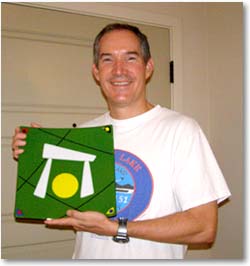
|
| Eric holds the plate he didn't actually win at the Denver Croquet Club's weekend Golf Croquet tournament. Courtesy of Rich Lamm, that trophy is on permanent display in the Sawyer home. |
Maybe that's the best way to look at all this. As Rhys points out, sometimes you lose, even when you win. This tournament showed me that sometimes you win, even though you lose. And Rich was the double winner. He won the tournament (in reality) and more importantly, he had fun! And incredibly, no fog banks were seen or felt by me after this tournament.
|
What does all this mean? As I suspected, I found no silver-bullet or garlic wreath to fend off losing. But I did discover a few thoughts that may help lighten my fog of depression, or at least help me lift out of it a little faster. I have distilled this article into a list of ways to help a poor loser not be (such) a loser: 6. Donít play croquet while on vacation. 5. Be a good sport. Immediately after a defeat, shake hands, smile and be gracious to the victor. Then you can hide under your bed. 4. You canít control how well your opponent plays. So donít worry about losing when your opponent plays flawlessly. It happens. Just focus on how you played. If you lost because of a flaw in your game, practice your way through the flaw. 3. Keep your perspective. Even after the worst loss imaginable, you still have your life, family, health, job, etc. 2. Sometimes you lose when you win; sometimes you win when you lose. 1. Have fun! Itís fun to win. Itís not fun to lose. But remember why we play. Itís supposed to be fun.
|
Eric Sawyer is an administrative law judge for the state of California. Before that, he was a Deputy Attorney General in the California Department of Justice, where he defended state agencies and state employees sued in state and federal trial courts, and helped to condemn easements for the state water project. Eric never lost a jury or bench trial contested on liability, so croquet proved to be his first consequential experience in losing. He lives in South Pasadena with his wife Caren.
The two of them started playing croquet together in 2000 as an activity they could do as a couple. While Caren has maintained a balanced attitude, Eric has become obsessed. His proudest achievements in the sport so far have been winning the First Flight USCA Golf Croquet National Championship in doubles with Caren in 2010, tying for third place in both singles and doubles in the Championship Flight of the USCA Golf Croquet National Championship in 2011, and being named the first alternate on the U.S. team that placed fourth in the inaugural Golf Croquet World Team Championship in 2012.
The members of the Pasadena Croquet Club live throughout Los Angeles County and vary greatly in age and race. Almost all the members still work, so weekend events are a staple and the courts are generally free for practice during work hours. Eric and Caren Sawyer initially founded the club in 2006 with David Collins and Mohammad Kamal, as part of the Pasadena Lawn Bowling Club. The four founding croquet members were welcomed by the lawn bowlers, who were struggling with membership. Over the past six years, Eric and Caren have helped build the croquet membership to 22.